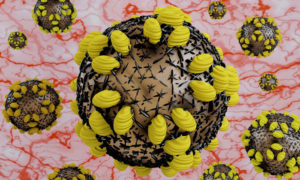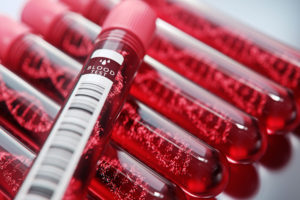Hepatocellular Carcinoma Plasma FFPE Samples
Bay Biosciences provides fresh frozen (-80°), high quality, clinical grade serum (sera), plasma and peripheral blood mononuclear cells (PBMC) biofluid samples processed from patient’s whole-blood. The serum (sera), plasma and PBMC biofluid samples are provided with matching tumor tissue FFPE blocks from 60 unique patients diagnosed with advanced Hepatocellular Carcinoma-HCC (Liver cancer) Stage II to Stage IV.

Detailed clinical data and pathology annotations including patient’s corresponding diagnostic test values associated with the HCC (liver cancer) tumor tissue samples with matching serum (sera), plasma and PBMC biofluid samples are provided to a valued pharmaceutical customer for drug discovery and research.
Hepatocellular carcinoma (HCC) is the most common type of primary liver cancer. Hepatocellular carcinoma occurs most often in people with chronic liver diseases, such as cirrhosis caused by hepatitis B or hepatitis C infection. However, up to 25% of patients have no history of cirrhosis or risk factors for it. In the United States, HCC is the ninth leading cause of cancer deaths.
Hepatocellular carcinoma (HCC) is the most common primary liver malignancy and is a leading cause of cancer related deaths worldwide. Several important risk factors have been identified, including chronic HBV infection, chronic HCV infection, NAFLD and NASH, alcoholic liver disease, hereditary hemochromatosis, and any other causes leading to cirrhosis. Liver cirrhosis remains the most important risk factor for the development of HCC regardless of etiology. Hepatitis B and C are independent risk factors for the development of cirrhosis. Alcohol consumption remains an important additional risk factor in the United States as alcohol abuse is five times higher than hepatitis C.
Cirrhosis is characterized by fibrosis and nodule formation of the liver, secondary to a chronic injury, which leads to alteration of the normal lobular organization of the liver. Various wounds and stress can injure the liver, including viral infections, toxins, inherited disorders, or autoimmune processes. With each injury, the liver forms scar tissue (fibrosis), initially without losing its normal function. After a long-standing injury, most of the liver tissue gets fibrosis, leading to loss of function and the development of cirrhosis.
Types of Liver Cancer
Primary liver cancer is a cancer that started in the liver. There are five main types of liver cancer. The type depends on the type of cell the cancer started in. If the cancer begins somewhere else and then spread (metastasize) to the liver it is called secondary liver cancer.
Hepatocellular Carcinoma
Hepatocellular carcinoma is also called hepatoma or HCC. It’s the most common type of primary liver cancer. This type of liver cancer develops from the main liver cells called hepatocytes. It’s more common in patients with cirrhosis. Liver cirrhosis means scarring of the liver due to previous damage, such as from the hepatitis B or C virus or long term alcohol drinking as described above. Hepatocellular carcinoma is more likely to develop in men than in women and becomes more common as you get older.
Fibrolamellar Carcinoma
Fibrolamellar carcinoma is a rare sub type of hepatocellular cancer (HCC). Fibrolamellar carcinoma tends to develop in people in their 20’s or 30’s, and it’s not usually linked with cirrhosis or infections with hepatitis B or C. The other main difference is that patients with fibrolamellar carcinomas don’t usually have higher levels of alpha fetoprotein (AFP) in their blood.
Cholangiocarcinoma (Bile Duct cancer)
Cholangio refers to the bile ducts, so cholangiocarcinoma is cancer of the bile ducts. The major bile ducts are tubes that connect the liver and gallbladder to the small bowel. The bile ducts carry bile, which is made by the liver. Bile helps to digest fats in food. Bile duct cancer is rare. Cancer that starts in the section of ducts outside the liver is called extrahepatic cholangiocarcinoma. Cancer that starts in the section of ducts inside the liver is called intrahepatic cholangiocarcinoma. Intrahepatic cholangiocarcinoma is classed as a type of primary liver cancer.
Angiosarcoma
Angiosarcoma is also known as Hemangiosarcoma. It’s a type of cancer called a soft tissue sarcoma. This type of cancer begins in the blood vessels of the liver, and is extremely rare. It is most often diagnosed in people in their 70s and 80s.
Hepatoblastoma
Hepatoblastoma is a very rare type of primary liver cancer that usually affects young children. It’s most often diagnosed in children under 3. Hepatoblastoma affects only 2 to 3 people in a million, less patients are diagnosed with hepatoblastoma each year. Chemotherapy and surgery are the main treatments.
Benign liver growths (non cancerous growths)
Most growths (tumor) in the liver are benign. They aren’t cancer and won’t become cancerous (malignant) in the future. Benign tumor do not usually need treatment. This can depend on the size of the tumor and whether it’s causing symptoms.
The most common types of benign tumors in the liver are:
- Hemangioma
- Hepatic adenoma
- Focal nodular hyperplasia

Bay Biosciences is a global leader in providing researchers with high quality, clinical grade, fully characterized human tissue samples, bio-specimens and human bio-fluid collections from cancer (tumor) tissue, cancer serum, cancer plasma cancer PBMC and human tissue samples from most other therapeutic areas and diseases.
Bay Biosciences maintains and manages it’s own bio-repository, human tissue bank (biobank) consisting of thousands of diseased samples (specimens) and from normal healthy donors available in all formats and types. Our biobank procures and stores fully consented, deidentified and institutional review boards (IRB) approved human tissue samples and matched controls.
All our human human tissue collections, human specimens and human bio-fluids are provided with detailed samples associated patient’s clinical data. This critical patient’s clinical data includes information relating to their past and current disease, treatment history, lifestyle choices, biomarkers and genetic information. Patient’s data is extremely valuable for researchers and is used to help identify new effective treatments (drug discovery & development) in oncology, other therapeutic areas and diseases. This clinical information is critical to demonstrate their impact, monitor the safety of medicines, testing & diagnostics, and generate new knowledge about the causes of disease and illness.
Bay Biosciences banks wide variety of human tissue samples and biological samples including cryogenically preserved -80°C, fresh, fresh frozen tissue samples, tumor tissue samples, FFPE’s, tissue slides, with matching human bio-fluids, whole blood and blood derived products such as serum, plasma and PBMC’s.
Bay Biosciences is a global leader in collecting and providing human tissue samples according to the researchers specified requirements and customized, tailor made collection protocols. Please contact us anytime to discuss your special research projects and customized human tissue sample requirements.
Bay Biosciences provides human tissue samples (human specimens) from diseased and normal healthy donors; including peripheral whole-blood, amniotic fluid, bronchoalveolar lavage fluid (BAL), sputum, pleural effusion, cerebrospinal fluid (CSF), serum (sera), plasma, peripheral blood mononuclear cells (PBMC’s), saliva, Buffy coat, urine, stool samples, aqueous humor, vitreous humor, kidney stones, renal calculi, nephrolithiasis, urolithiasis and other bodily fluids from most diseases including cancer. We can also procure most human bio-specimens and can do special collections and requests of human samples that are difficult to find. All our human tissue samples are procured through IRB approved clinical protocols and procedures.
In addition to the standard processing protocols Bay Biosciences can also provide human plasma, serum, PBMC bio-fluid samples using custom processing protocols, you can buy donor specific sample collections in higher volumes and specified sample aliquoting from us. Bay Biosciences also provides human samples from normal healthy donors, volunteers, for controls and clinical research, contact us Now.
日本のお客様は、ベイバイオサイエンスジャパンBay Biosciences Japanまたはhttp://baybiosciences-jp.com/contact/までご連絡ください。


